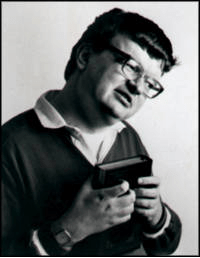Savants in the News

Last month I wrote a post on my experiences with Max Weisberg, a mentally disabled savant who put his numerical talents to work as a sports bookmaker. I’ve long been interested in people like Max with an extraordinary mental gift amid deficits or disabilities.
Commonly called savants (sometimes with the obsolete and inaccurate prefix idiot), those people often draw attention and make news. If your interests are like mine, you may find these recent stories of savants to be thought provoking and fascinating.
• In an account written for the Wisconsin Medical Society, Derek Amato explains how he became “Rain Man Beethoven” following a swimming pool diving accident in which he suffered a severe concussion. In addition to memory and hearing problems, the accident left him with newfound musical aptitude. Darold A. Treffert, M.D., a psychiatrist who has extensively studied savants, wrote that Amato’s experience astonished him and remains the only known case of an injury resulting in sudden musical savant syndrome.
• A new book by Thomas Fabricius, Autism and the Savant Hypothesis, examines the relationship between savant behaviors and autism.
• In a blog post for Slate, Katy Waldman looks at a recent study that finds autism running in the families of many child prodigies. People with savant abilities are not necessarily child prodigies, or visa versa, but Waldman explains that “the line between savant and prodigy seems slightly blurrier when viewed through the lens of this investigation, led by Ohio State Mansfield professor Joanne Ruthsatz and concert violinist Jourdan Urbach.”
• From New Zealand comes the story of teenager Julian McLaren, who is autistic and has perfect pitch as well as a strong musical memory. “He has such huge talents and strength,” his music teacher says. “Some things it will take me five or six years to teach to an average student, Julian can pick up in about five seconds.”
• Wired magazine’s Tanya Lewis wrote a story about the efforts of neuroscientist Allan Snyder of the University of Sydney to develop electrical brain stimulation that allows anyone to tap unused, savant-like abilities.
• The Telegraph of London reported on Paul Frampton, a University of North Carolina physicist described by his ex-wife as a savant, who “specializes in the secrets of time and space.” Reporter Philip Sherwell notes that Frampton currently occupies space in a prison cell in Argentina after his arrest for allegedly smuggling cocaine into the country. Frampton claims to be innocent, the victim of a scheme to lure him to South America for a romantic tryst with a woman who supposedly held the title of “Miss Bikini World.”